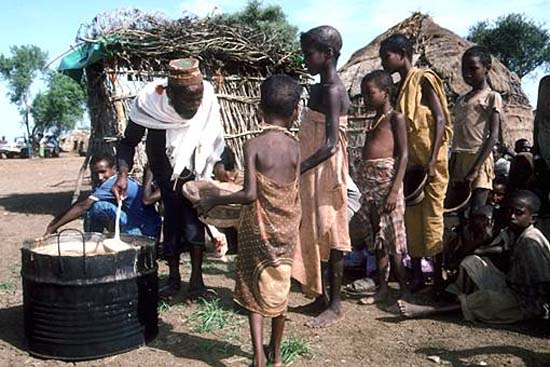
Kenya RPCV John Miskell spent 4 years doing AID work in Somalia
MERCA, SOMALIA
AID WORK IS AN addiction. Something happens, and your life—which was going to be normal, with a family and a good job that you perform with decreasing enthusiasm over the years—becomes exceptional, forever. And you can't imagine it otherwise.
In 1969 John Miskell, having just graduated from Syracuse University's College of Environmental Science and Forestry, joined the Peace Corps, figuring on a year or two of adventure before settling down. He was sent to Kenya, where his sojourn coincided with a famine. Incompetence and corruption hindered efforts to feed the hungry, so they died, sometimes right in front of Miskell, who was teaching high school in Wajir, a village in the north (and trapping poisonous snakes and selling them to a zoo in his spare time).
"I thought when I joined the Peace Corps that I would do my two years and go home and look for a job as a forester or entomologist," he told me. "My first year in Wajir changed that." He met Zahra Hussein Awale, an enchanting Somali secretary traveling through Kenya, and they got married. When his hitch in the Peace Corps ended, he took a job in the entomology department at the National Museum in Nairobi, where he spent most of his time in a cavernous room with 250,000 beetle specimens. When funds for that job ran out, he decamped with his wife and two young children (two more would come later) to Mogadishu, well before the city devolved into a synonym for anarchy, to conduct a bird survey for the UN.
Eventually funding for that project ran dry too, so he took a job with CARE. There are thousands of nongovernmental organizations, or NGOs, across the globe, but CARE ranks among the elite, in terms of reliability and efficiency, along with Médecins Sans Frontières, Save the Children, World Vision, the International Rescue Committee, and several others. Founded in 1945 as a vehicle to send aid packages to survivors of World War II, CARE then stood for Cooperative for American Remittances to Europe. The group, headquartered in Atlanta, Georgia, has since changed its name to Cooperative for Assistance and Relief Everywhere; it operates in more than 60 countries with more than 10,000 employees, the vast majority of them Third World citizens working in the Third World.
Most NGOs tend to see the UN, their ubiquitous counterpart in relief operations, as a 900-pound gorilla. And while UN personnel usually get along quite well with NGO workers in the field, their bureaucratic cultures are polar opposites. In Nairobi, an NGO like CARE is based in a rented house filled with a few dozen staffers. The UN agencies occupy a sprawling campus with landscaped grounds and more than a thousand well-paid employees. NGO staffers will tell you that the UN wastes almost as much money as it spends; UN officials sniff that the NGOs are nickel-and-dime amateurs.
Miskell is a pro. He spent four years in Somalia with CARE before shifting to eastern Sudan in 1985 for three years; then, in 1988, to Uganda; then to a remote corner of Bangladesh in 1993, because, as he says, "No one wanted to go there." He stayed for a year and a half, at which point he was asked to take charge of a CARE project in a remote part of Sudan, another place no one wanted to go. Later he was sent to Tanzania for a spell, then back to Sudan in 1998; finally, last year, his pinball trajectory deposited him back in Somalia. His family could not quite keep up: In 1991 they moved to Geneseo, New York, so that his children could attend high school and college in America. One of his sons is now in the U.S. Army, just back from Bosnia; another recently moved to Washington, D.C.; and a third is finishing high school in Geneseo. His ten-year-old daughter, born in Mogadishu, is starting sixth grade this fall. Miskell sees them twice a year, during vacations. Two months with his family, ten in Africa.
Miskell is based on the outskirts of Merca, 60 miles south of Mogadishu; it is too dangerous for him to live in the capital. In many respects, CARE's Merca villa is splendid. If you stand on the balcony you have a view of the turquoise Indian Ocean a few hundred yards in front of you; if you look to the left, Merca's colonial precincts unfold, a whitewashed mix of African and Arabic and Italian architecture, like an apparition from a Paul Bowles novel. A strong, warm wind blows off the ocean. One hears the regular calls to prayer, occasional ruptures of gunfire, and, when kids in the street catch a glimpse of you, excited shouts of "Gal! Gal!"—Somali for "infidel."
It's comfortable, as prisons go. The villa's steel gate is locked at all times. Miskell does not leave without at least three armed bodyguards, and he rarely walks anywhere. There is a handful of foreign aid workers in Merca, mostly Italians rebuilding local schools, and they follow the same rules. One Italian aid worker was assassinated a few years back—the killer slipped into her villa, shot her in the head, and ran out. Last year more than a dozen aid workers were kidnapped in southern Somalia: Ten staffers for the International Committee of the Red Cross were seized in April, threatened with death, and then released after two weeks. (The ICRC says no ransom was paid, but a news report claimed that $150,000 changed hands.) That same month another Italian was abducted and held for three weeks, and a top WFP official traveling in Mogadishu was kidnapped for a few days at the end of 1999. It was his second abduction.
